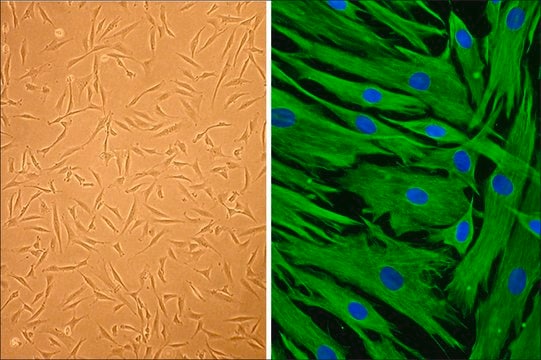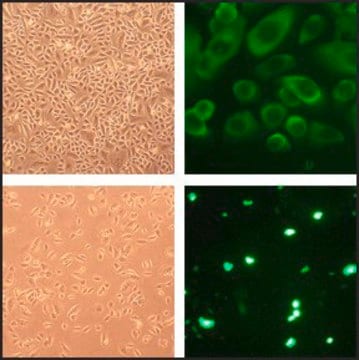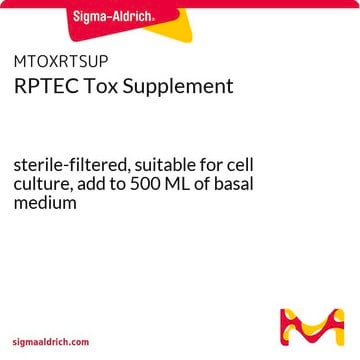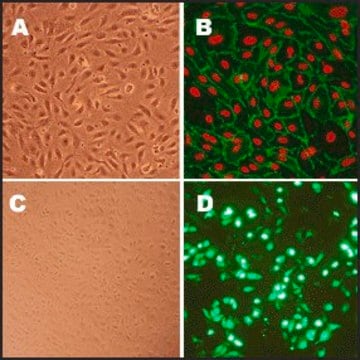930-05A
Human Renal Proximal Tubular Epithelial Cells: HRPTEpC, adult
Synonyme(s) :
Proximal Tubular Epithelial Cells
Se connecterpour consulter vos tarifs contractuels et ceux de votre entreprise/organisme
About This Item
Code UNSPSC :
41106514
Nomenclature NACRES :
NA.81
Produits recommandés
Source biologique
human kidney
Niveau de qualité
Conditionnement
pkg of 500,000 cells
Fabricant/nom de marque
Cell Applications, Inc
Mode de croissance
Adherent
Technique(s)
cell culture | mammalian: suitable
Conditions d'expédition
dry ice
Température de stockage
−196°C
Description générale
Lot specific orders are not able to be placed through the web. Contact your local sales rep for more details.
Human Renal Proximal Tubular Epithelial Cells (HRPTEpC) provide a useful tool for studying various aspects of pathology and biology of the human renal proximal tubular cells in vitro. HRPTEpC have recently been used in a study of metabolic enzymes responding to energy depletion in renal cells. HRPTEpCs have a pivotal role in kidney function including reabsorbtion of glucose and protein, and also play a part in the glucotoxicity associated with diabetes.
Human Renal Proximal Tubular Epithelial Cells (HRPTEpC) provide a useful tool for studying various aspects of pathology and biology of the human renal proximal tubular cells in vitro. HRPTEpC have recently been used in a study of metabolic enzymes responding to energy depletion in renal cells. HRPTEpCs have a pivotal role in kidney function including reabsorbtion of glucose and protein, and also play a part in the glucotoxicity associated with diabetes.
Origine de la lignée cellulaire
Kidney
Application
Kidney disease, diabetes, glucotoxicity, pathology. kidney function, reabsorbtion of glucose and protein, biology of renal proximal tubular cells in vitro, metabolic enzymes, cell energy usage.
Conditionnement
First or second passage, >500,000 cells in RenaEpi Basal Medium containing 10% FBS & 10% DMSO.
Composants
RenaEpi Basal Medium containing 10% FBS & 10% DMSO
Qualité
Each lot was tested for proper morphology, ability to attach and spread on tissue culture ware surface, and proliferate in RenaEpi Growth Medium, Negative for HIV, Hepatitis B, Hepatitis C, mycoplasma, bacteria, and fungi.
Autres remarques
Can be cultured at least 6 population doublings
Clause de non-responsabilité
Ce produit, destiné à la recherche scientifique, est soumis à une réglementation spécifique en France, y compris pour les activités d'importation et d'exportation (Article L 1211-1 alinéa 2 du Code de la Santé Publique). L'acheteur (c'est-à-dire l'utilisateur final) est tenu d'obtenir une autorisation d'importation auprès du Ministère français de la Recherche, mentionné à l'article L1245-5-1 II du Code de la Santé Publique. En commandant ce produit, vous confirmez détenir l'autorisation d'importation requise.
Code de la classe de stockage
10 - Combustible liquids
Classe de danger pour l'eau (WGK)
WGK 3
Point d'éclair (°F)
Not applicable
Point d'éclair (°C)
Not applicable
Certificats d'analyse (COA)
Recherchez un Certificats d'analyse (COA) en saisissant le numéro de lot du produit. Les numéros de lot figurent sur l'étiquette du produit après les mots "Lot" ou "Batch".
Déjà en possession de ce produit ?
Retrouvez la documentation relative aux produits que vous avez récemment achetés dans la Bibliothèque de documents.
Les clients ont également consulté
Fatimah K Khalaf et al.
Journal of the American Heart Association, 9(3), e013933-e013933 (2020-02-06)
Background Recent studies have highlighted a critical role for a group of natriuretic hormones, cardiotonic steroid (CTS), in mediating renal inflammation and fibrosis associated with volume expanded settings, such as chronic kidney disease. Immune cell adhesion is a critical step
Duygu Elif Yilmaz et al.
The Journal of biological chemistry, 298(3), 101589-101589 (2022-01-17)
Current immunosuppressive strategies in organ transplantation rely on calcineurin inhibitors cyclosporine A (CsA) or tacrolimus (Tac). Both drugs are nephrotoxic, but CsA has been associated with greater renal damage than Tac. CsA inhibits calcineurin by forming complexes with cyclophilins, whose
Notre équipe de scientifiques dispose d'une expérience dans tous les secteurs de la recherche, notamment en sciences de la vie, science des matériaux, synthèse chimique, chromatographie, analyse et dans de nombreux autres domaines..
Contacter notre Service technique









